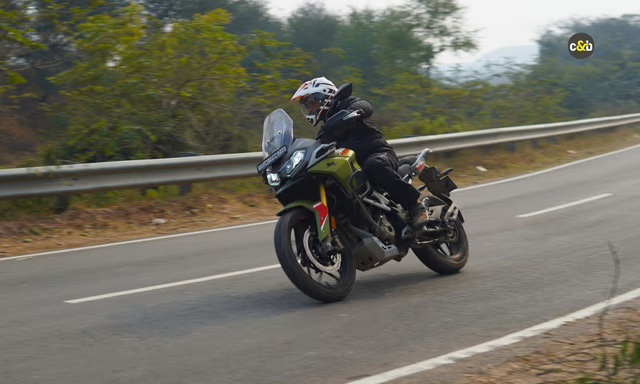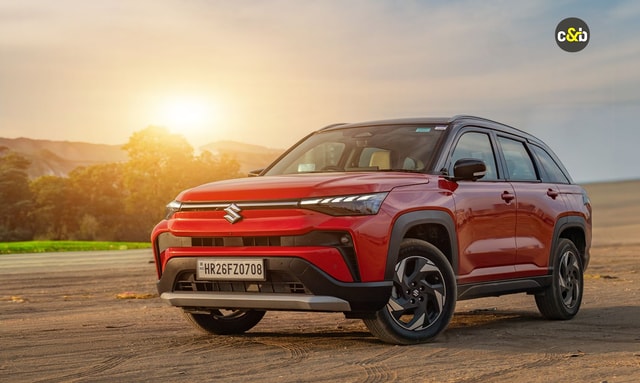California Paves Way To Self-Driving Car Tests Without Humans
car&bike Team
1 min read
Mar 13, 2017, 07:40 PM

Key Highlights
- The state has licensed 27 companies to test driverless cars
- California granted testing permit to ride service firm Uber Technologies
- The change provides a path to the eventual sale of driverless cars
California, the largest U.S. car market, plans to allow testing on public roads of self-driving vehicles without human backup drivers by the end of the year, state officials said. The state's Department of Motor Vehicles is seeking public comment on proposed regulations for driverless testing and public use of autonomous vehicles that will no longer be required to have conventional manual controls such as steering wheels and pedals.
Current regulations require such vehicles to have those controls, as well as a backup driver. The proposed change provides a path to the eventual sale and deployment of self-driving vehicles in California, state transportation secretary Brian Kelly said in a statement.
The state has licensed 27 companies to test driverless vehicles on public roads, including vehicle manufacturers from BMW to Tesla Inc; suppliers such as Delphi Automotive Plc and Nvidia Corp; technology companies such as Alphabet Inc's Waymo and China's Baidu Inc; and a long list of self-driving startups such as Zoox, Drive.ai, AutoX and PlusAI. Also licensed are China-funded electric vehicle startups NextEV and Faraday Future.
Earlier this week, California granted a testing permit to ride services firm Uber Technologies after a legal standoff last December.
The proposed regulations enable manufacturers to certify that their driverless test vehicles can operate without conventional controls. The cars must meet federal safety standards or have an exemption from the National Highway Traffic Safety Administration, DMV Deputy Director Brian Soublet said in a media briefing on Friday.
The state will "rely heavily" on the federal guidelines for self-driving vehicles released last fall by the agency, Soublet said. Driverless vehicles must also have a remote operator who is capable of monitoring the vehicle's operation and communicating with any passengers.
A number of automakers have said they plan to begin deploying self-driving vehicles, some of them in commercial fleets, by 2020-2021.California initiated a 45-day public comment period, starting Friday, on the proposed rules changes, to be followed by a public hearing on April 25.
Current regulations require such vehicles to have those controls, as well as a backup driver. The proposed change provides a path to the eventual sale and deployment of self-driving vehicles in California, state transportation secretary Brian Kelly said in a statement.
The state has licensed 27 companies to test driverless vehicles on public roads, including vehicle manufacturers from BMW to Tesla Inc; suppliers such as Delphi Automotive Plc and Nvidia Corp; technology companies such as Alphabet Inc's Waymo and China's Baidu Inc; and a long list of self-driving startups such as Zoox, Drive.ai, AutoX and PlusAI. Also licensed are China-funded electric vehicle startups NextEV and Faraday Future.
Earlier this week, California granted a testing permit to ride services firm Uber Technologies after a legal standoff last December.
The proposed regulations enable manufacturers to certify that their driverless test vehicles can operate without conventional controls. The cars must meet federal safety standards or have an exemption from the National Highway Traffic Safety Administration, DMV Deputy Director Brian Soublet said in a media briefing on Friday.
The state will "rely heavily" on the federal guidelines for self-driving vehicles released last fall by the agency, Soublet said. Driverless vehicles must also have a remote operator who is capable of monitoring the vehicle's operation and communicating with any passengers.
A number of automakers have said they plan to begin deploying self-driving vehicles, some of them in commercial fleets, by 2020-2021.California initiated a 45-day public comment period, starting Friday, on the proposed rules changes, to be followed by a public hearing on April 25.
© Thomson Reuters 2017
(This story has not been edited by NDTV staff and is auto-generated from a syndicated feed.)
Latest News
 Jaiveer Mehra | Feb 27, 2026New Tata Tiago EV Spied Testing On Indian Roads: Enhanced Range Incoming?Launched in India in 2022, the Tiago EV received a notable update last year, adding in newer features and some styling tweaks.3 mins read
Jaiveer Mehra | Feb 27, 2026New Tata Tiago EV Spied Testing On Indian Roads: Enhanced Range Incoming?Launched in India in 2022, the Tiago EV received a notable update last year, adding in newer features and some styling tweaks.3 mins read car&bike Team | Feb 27, 2026VLF Mobster 135 Price Hiked As Introductory Offer EndsThe Mobster 135 is now priced at Rs 1.37 lakh (ex-showroom), which marks an increase of Rs 7,000.2 mins read
car&bike Team | Feb 27, 2026VLF Mobster 135 Price Hiked As Introductory Offer EndsThe Mobster 135 is now priced at Rs 1.37 lakh (ex-showroom), which marks an increase of Rs 7,000.2 mins read car&bike Team | Feb 27, 2026New MG plug-in hybrid SUV Spied testing In India AgainMG’s next new launch in the Indian market could be the Wuling Starlight 560-based model that has been spied on test for the second time in India.2 mins read
car&bike Team | Feb 27, 2026New MG plug-in hybrid SUV Spied testing In India AgainMG’s next new launch in the Indian market could be the Wuling Starlight 560-based model that has been spied on test for the second time in India.2 mins read Jaiveer Mehra | Feb 27, 2026Mini Cooper S Victory Edition Bookings Open In IndiaSpecial edition of the Mini hatchback commemorates the brand’s 1965 Monte Carlo Rally victory.1 min read
Jaiveer Mehra | Feb 27, 2026Mini Cooper S Victory Edition Bookings Open In IndiaSpecial edition of the Mini hatchback commemorates the brand’s 1965 Monte Carlo Rally victory.1 min read Girish Karkera | Feb 27, 2026BMW Chairman Oliver Zipse Named 2026 World Car Person of the YearThe award makes him part of a select industry leaders to make the cut.1 min read
Girish Karkera | Feb 27, 2026BMW Chairman Oliver Zipse Named 2026 World Car Person of the YearThe award makes him part of a select industry leaders to make the cut.1 min read car&bike Team | Feb 26, 2026Triumph 350 cc Range India Launch By April 2026Bajaj had confirmed the development of the 350 cc Triumph models back in November, following the GST rate reforms.1 min read
car&bike Team | Feb 26, 2026Triumph 350 cc Range India Launch By April 2026Bajaj had confirmed the development of the 350 cc Triumph models back in November, following the GST rate reforms.1 min read
 Preetam Bora | Feb 24, 2026Hero Destini 110 Review: Simplicity, RefinedThe Hero Destini 110 is a no-nonsense commuter that is simple, comfortable and above all, fuel efficient. In 2026, when buyers are spoilt for choice, is it good enough to consider?1 min read
Preetam Bora | Feb 24, 2026Hero Destini 110 Review: Simplicity, RefinedThe Hero Destini 110 is a no-nonsense commuter that is simple, comfortable and above all, fuel efficient. In 2026, when buyers are spoilt for choice, is it good enough to consider?1 min read Preetam Bora | Feb 23, 2026TVS Apache RTX Road Test Review: Redefining the Entry-Level ADVAfter spending some time with the TVS Apache RTX in traffic, the daily commute, as well as on open highways, one thing becomes clear: the RTX is trying to redefine the entry-level ADV segment. But is it without fault?1 min read
Preetam Bora | Feb 23, 2026TVS Apache RTX Road Test Review: Redefining the Entry-Level ADVAfter spending some time with the TVS Apache RTX in traffic, the daily commute, as well as on open highways, one thing becomes clear: the RTX is trying to redefine the entry-level ADV segment. But is it without fault?1 min read Girish Karkera | Feb 20, 2026Road Test: 2025 VinFast VF7 AWD Sky InfinityFlagship all-electric SUV from the Vietnamese car maker gets most of the basics right.1 min read
Girish Karkera | Feb 20, 2026Road Test: 2025 VinFast VF7 AWD Sky InfinityFlagship all-electric SUV from the Vietnamese car maker gets most of the basics right.1 min read Jaiveer Mehra | Feb 18, 2026New BMW X3 30 Vs Mercedes-Benz GLC 300: Midsize Luxury SUV FaceoffWith the new X3 30, BMW has a direct competitor to the petrol GLC 300, but which is the luxury SUV for you?1 min read
Jaiveer Mehra | Feb 18, 2026New BMW X3 30 Vs Mercedes-Benz GLC 300: Midsize Luxury SUV FaceoffWith the new X3 30, BMW has a direct competitor to the petrol GLC 300, but which is the luxury SUV for you?1 min read Jafar Rizvi | Feb 15, 2026Maruti Suzuki Victoris: Long-Term Review - Report 1The Victoris is Maruti’s latest offering for the Indian market, and after spending some time with it, here are a few early impressions.1 min read
Jafar Rizvi | Feb 15, 2026Maruti Suzuki Victoris: Long-Term Review - Report 1The Victoris is Maruti’s latest offering for the Indian market, and after spending some time with it, here are a few early impressions.1 min read
























































































































